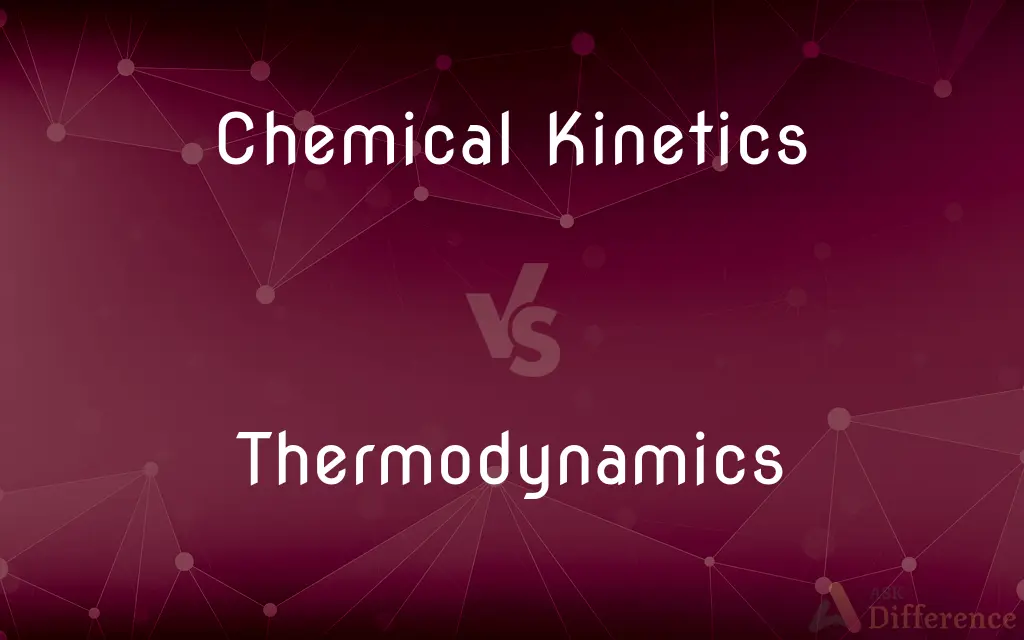Chemical Kinetics vs. Thermodynamics — What's the Difference?
By Tayyaba Rehman — Published on November 19, 2023
Chemical Kinetics studies the rate of chemical reactions, while Thermodynamics evaluates the energy changes and direction of reactions. Both govern chemical behavior.

Difference Between Chemical Kinetics and Thermodynamics
Table of Contents
ADVERTISEMENT
Key Differences
Chemical Kinetics and Thermodynamics are both pivotal branches in the study of chemistry, but they address different aspects. Chemical Kinetics delves into the speed or rate at which reactions occur. It provides insights into the factors affecting these rates, like temperature, concentration, and the presence of catalysts. In contrast, Thermodynamics is concerned with energy changes, the driving force of reactions, and their spontaneity. It doesn't focus on how fast a reaction occurs but whether it will occur.
In the realm of Chemical Kinetics, questions like "How fast is the reaction?" and "What factors speed it up?" are commonplace. Thermodynamics, on the other hand, answers queries such as "Is the reaction spontaneous?" and "How much energy is involved?". Essentially, while Chemical Kinetics tells us the speed, Thermodynamics informs us of the possibility and extent.
Another way to discern the difference is by viewing Chemical Kinetics as the study of the journey, observing how reactants transform into products over time. Thermodynamics, however, is more like the study of the destinations, discerning the beginning and end states of a reaction without much concern for the journey between.
To encapsulate, Chemical Kinetics provides a dynamic view, examining the changing rates and pathways of chemical reactions. In contrast, Thermodynamics offers a more static perspective, focusing on the energy states and feasibility of reactions without concern for their speed.
Comparison Chart
Focus
Rate of reactions
Energy changes and directionality of reactions
ADVERTISEMENT
Questions Addressed
How fast? What affects the rate?
Is it spontaneous? How much energy is involved?
Nature
Dynamic
Static
Variables commonly studied
Concentration, temperature, catalysts
Temperature, pressure, volume, entropy, enthalpy
Outcome
Provides reaction rate and mechanism
Determines feasibility and energy change of reactions
Compare with Definitions
Chemical Kinetics
It's concerned with the rate-determining step.
Chemical Kinetics helped identify the slowest step in the sequence.
Thermodynamics
Thermodynamics studies energy changes in systems.
Using Thermodynamics, the energy released in combustion was calculated.
Chemical Kinetics
Deals with reaction mechanisms.
Chemical Kinetics helped in proposing a plausible pathway for the reaction.
Thermodynamics
Defines principles governing energy transfer.
The first law of Thermodynamics emphasizes energy conservation.
Chemical Kinetics
Studies how reactants change to products over time.
The graph displayed a clear Chemical Kinetics trend showing reactant consumption.
Thermodynamics
Studies variables like entropy and enthalpy.
Thermodynamics helped explain the increased disorder using entropy.
Chemical Kinetics
Chemical Kinetics studies how fast reactions occur.
With the principles of Chemical Kinetics, she determined the reaction's speed.
Thermodynamics
Evaluates reaction spontaneity.
Thermodynamics revealed that the reaction was non-spontaneous at room temperature.
Chemical Kinetics
Analyzes factors affecting reaction speeds.
Through Chemical Kinetics, he understood how temperature accelerated the process.
Thermodynamics
Concerned with system's equilibrium state.
The Thermodynamics of the system showed it was in equilibrium at 25°C.
Thermodynamics
(used with a sing. verb) Physics that deals with the relationships and conversions between heat and other forms of energy.
Thermodynamics
(used with a pl. verb) Thermodynamic phenomena and processes.
Thermodynamics
(physics) The science of the conversions between heat and other forms of energy.
Thermodynamics
The science which treats of the mechanical action or relations of heat.
Thermodynamics
The branch of physics concerned with the conversion of different forms of energy
Common Curiosities
How does temperature influence reaction rate?
Generally, increasing temperature speeds up reactions, a principle of Chemical Kinetics.
What's entropy in Thermodynamics?
It's a measure of the system's disorder or randomness.
Why don't all spontaneous reactions occur instantly?
While Thermodynamics might favor spontaneity, the reaction rate, governed by Chemical Kinetics, might be slow.
What determines if a reaction will happen spontaneously?
Thermodynamics, specifically the Gibbs free energy.
What is Chemical Kinetics?
It's the branch of chemistry studying the rate and mechanisms of chemical reactions.
What does Thermodynamics study?
It investigates the energy changes, spontaneity, and directionality of chemical processes.
Is reaction speed a Thermodynamic property?
No, it pertains to Chemical Kinetics.
How do catalysts relate to Chemical Kinetics?
Catalysts affect the rate of reactions by providing an alternate pathway, a concept in Chemical Kinetics.
Can Thermodynamics predict reaction mechanisms?
No, that's a domain of Chemical Kinetics.
What is the zeroth law of Thermodynamics?
It states that if two systems are each in thermal equilibrium with a third, they're in equilibrium with each other.
Share Your Discovery

Previous Comparison
Primary Minerals vs. Secondary Minerals
Next Comparison
Borax vs. Baking SodaAuthor Spotlight
Written by
Tayyaba RehmanTayyaba Rehman is a distinguished writer, currently serving as a primary contributor to askdifference.com. As a researcher in semantics and etymology, Tayyaba's passion for the complexity of languages and their distinctions has found a perfect home on the platform. Tayyaba delves into the intricacies of language, distinguishing between commonly confused words and phrases, thereby providing clarity for readers worldwide.
















































